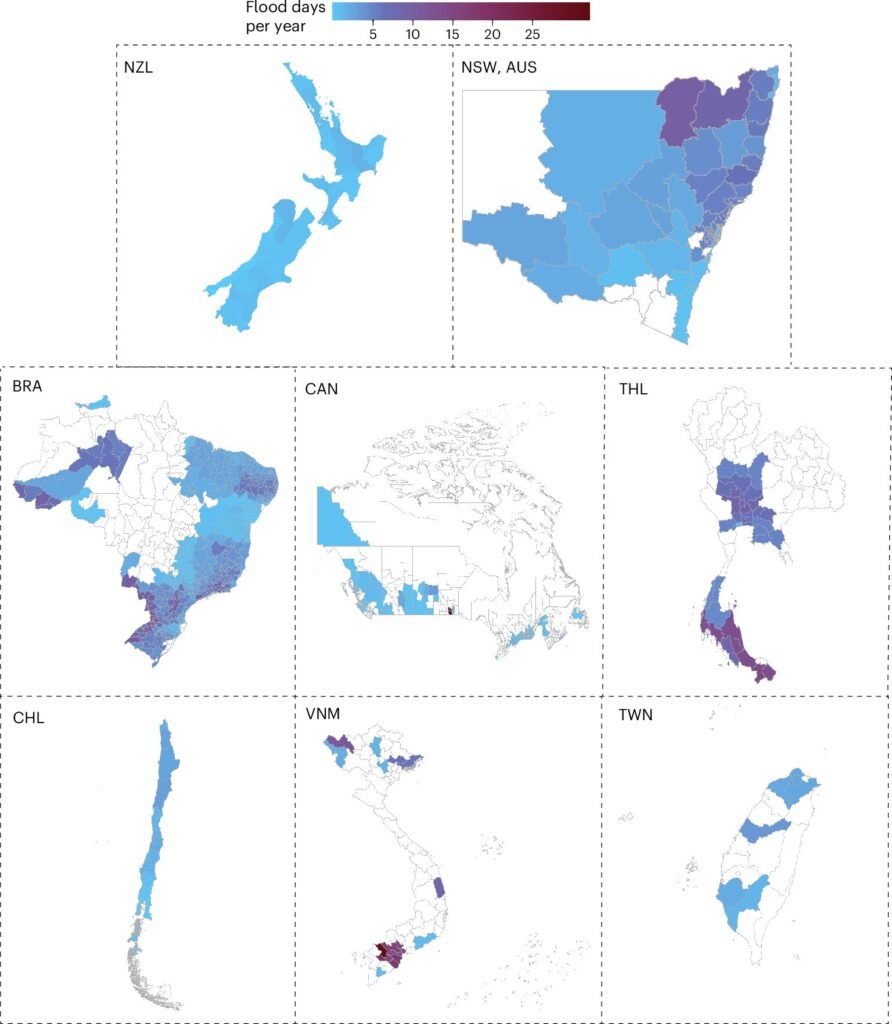The world’s largest and most comprehensive study of the long-term health impacts of flooding—via analysis of over 300 million hospitalization records in eight countries prone to flooding events—has found an increased risk of 26% of all diseases serious enough to require hospitalization. This impact on the health of communities lasts up to seven months post event.
The study, led by Monash University researchers, and published in the journal, Nature Water, found that flooding events—which are increasing globally due to climate change—led to increases in hospitalization for cardiovascular diseases (35%), respiratory diseases (30%), infectious diseases (26%), digestive diseases (30%) such as gastroenteritis, mental health disorders (11%), diabetes (61%), cancer (34%), nervous system disorders (34%), and renal diseases (40%).
Led by Professors Yuming Guo and Professor Shanshan Li, the study covered the period from 2010 to 2019, looking at 747 communities from eight countries/territories that had experienced major flood events in that period, including the northeast region of New South Wales in Australia, along the Amazon River and the southern region of Brazil, within the Mekong Basin in Vietnam, and in the south region of Thailand.
An estimated 23% of the global population is exposed to inundation due to serious flooding equivalent to a 1 in 100-year event. According to Professor Guo, there will be “an escalation in the severity, duration and frequency of floods due to the more frequent extreme precipitation events and rising sea levels due to global warming.”
While the health impacts of flooding, such as drowning, electrocution, and hypothermia, are expected, this is the first and most comprehensive study to look at broader impacts on health, “suggesting that the health impact of floods may have been underestimated and will further exacerbated as climate changes,” Professor Guo said.
The countries involved in the study were Australia, Vietnam, Brazil, Canada, Chile, Thailand, New Zealand and Taiwan.
How floods have a long-term impact on health
Flood events impact health through the contamination of the water supply system, which can elevate the risk of digestive diseases and aid the spread of infectious diseases. Additionally, floods can create environments that are conducive to the growth of fungi, bacteria, viruses, and vectors like mice and insects, which can trigger outbreaks of respiratory, digestive, and infectious diseases.
Floods may also force massive evacuations, causing displacement. Even when temporary shelters are provided, insufficient sanitation facilities often result in hygiene issues, raising the likelihood of respiratory, digestive, and infectious diseases.
Access and capacity to health care services may be impaired after floods, leading to delays in regular medical interventions, which include dialysis for renal diseases, chemotherapy and radiotherapy for cancer, and medication regimens for cardiovascular diseases, respiratory diseases, infectious diseases, digestive diseases, mental disorders, diabetes, nervous system disorders, and renal diseases.
And long-term psychological stress (e.g., from property damage and financial losses) can worsen or induce adverse health outcomes by compromising the immune system, disrupting sleep, leading to substance abuse, and diminishing self-care.
More information:
Yang, Z. et al. Hospitalization Risks Associated with Floods in Multi-Country Study, Nature Water (2025). DOI: 10.1038/s44221-025-00425-8, www.nature.com/articles/s44221-025-00425-8
Citation:
Flooding associated with 26% higher hospitalization risk for up to seven months, large-scale study reveals (2025, April 8)
retrieved 8 April 2025
from https://medicalxpress.com/news/2025-04-higher-hospitalization-months-large-scale.html
This document is subject to copyright. Apart from any fair dealing for the purpose of private study or research, no
part may be reproduced without the written permission. The content is provided for information purposes only.


